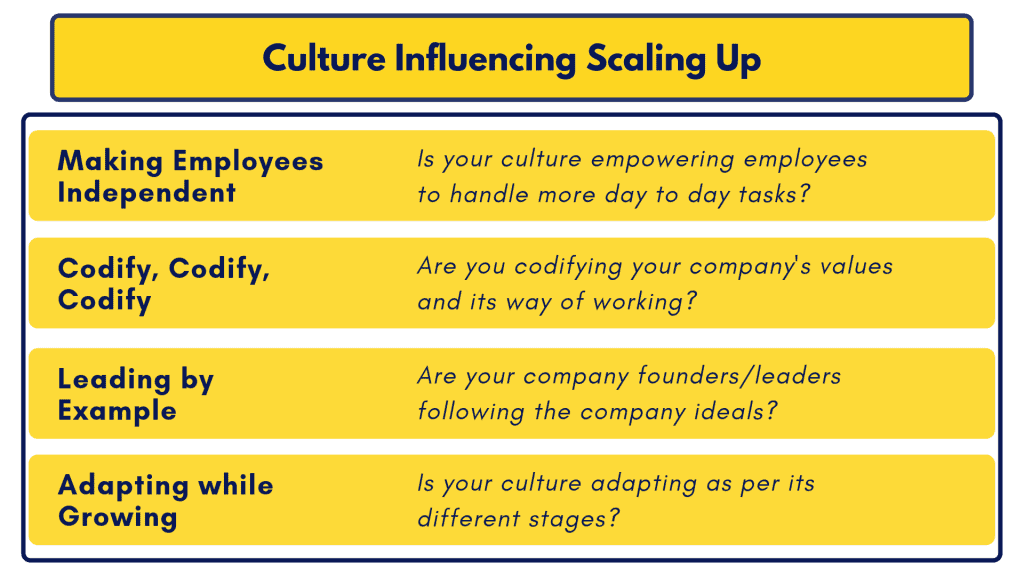“Scaling challenges nearly always come down to the same problem: the difficulty of spreading something good from those who have it to those that don’t – or at least don’t yet. It is always, in other words, the problem of more.”
– Robert I. Sutton, Professor of Management Science and Engineering 1
Every business wants to scale up with time, but there are several challenges that a company encounters in this process. But, firstly, what defines ‘scaling up’? According to one report, company scaling up includes continuous growth, increased efficiency, the maximum advantage of company capital, delivery of high-level products/services, and the ability to replicate the program model2. Sounds logical, isn’t it?
The challenges of scale-up begin as the company grows. It could be related to the confusion about the speed at which a business should grow, how many people to hire, what marketing strategy to use to promote products/services, etc. There are a plethora of questions businesses will have to answer to decrease the possibility of unpleasant surprises and increase the chances of scaling up successfully.
“A big-company CEO defines the problem of business scale as “the proliferation of a thousand tiny flowers that don’t grow bigger over time.” Seemingly great new products may get early market traction, but never become significant revenue producers even though the company has a large and loyal customer base, sales force, and brand position.”
– Diane Pierson, Instructor – Pragmatic Marketing 3
Scale-up challenges are faced by both, large companies as well as startups. However, their challenges differ. While bigger organizations must focus more on innovation to accelerate their growth, smaller organizations have the challenge of remaining successful as they expand. It is important to do things right to scale up successfully and prevent serious negative consequences.
There are various examples of both large and small-sized companies shutting down while scaling up. For instance, Kingfisher reached the highest marketing share in India in 2009. However, due to not focusing on optimizing one area of business, an unsustainable business model, and others, the company eventually lead to its decline 4. There are also examples of initially successful startups such as Doppler Labs, which closed due to not being able to scale as fast as the competition 5. As per the statistics, only 8% of startups are able to cross this chasm 8.
Clearly, scaling up requires companies to think harder on what decisions they are making on various aspects of the business. The solution is to keep a tab of the variety of problems that may occur. While companies have little control over what can happen externally, they can begin by focusing on their culture that tackles the problems with high effectiveness.
How does Culture Influence Scaling Up?
“Having built several companies now, one of the most important lessons I’ve taken from the experience is the need to manage culture from the very beginning. A culture is a tool that when done right can accelerate growth, or really inhibit success when ignored. In any organization, there are so many small decisions every day that seems immaterial, but later turn out to have vast consequences.”
– Stephan Schambach, Founder of NewStore, Demandware, Intershop 6
Every decision, every strategy, and every step that a company takes is going to define its future. Thus, it is important to take action when the organization, as a whole, is ready for it. Building a culture that is vigilant and competent to deal with the scaling up of their organization is imperative. Following are areas to keep in mind while building the right culture to scale up:

Empowering Employees to be Independent: For a company to scale up successfully, leaders must ensure to help, motivate, and develop the next layer of employees to be independent and competent. Leaders can do so by setting the right way of doing things. They should train their employees the same, so they are able to follow their lead. However, this does not mean bringing in rigidity in the way things are being done. It is more about encouraging and helping employees to get to a place where they can understand how things are managed on a regular basis. This helps in making the company more agile, independent, and competent, which successfully helps the company to tackle the challenges of scaling up.
“One key mistake is trying to stay involved in all decisions. Instead, you need to find and develop great leadership, empower them to act, and get out of their way. This doesn’t mean not being involved; it just means not being involved in EVERYTHING.”
– David Hassell, CEO, 15Five 6
Codify, Codify, Codify: Identifying and codifying a company’s value system and the “way of working” is just as important as planning business processes. Once there is a good understanding of what values are unique to the company, they should be communicated well. This is an important area in an organization and should not be left to assumptions. Understanding company values and promoting the same gives a sense of collectiveness and collaboration and is thus, extremely important. This further helps in attracting and hiring the right talent for the company. It also keeps the company’s core alive, no matter how big it grows.
“..hiring people who fit into your culture is just as, if not more important than talent alone. Employees that don’t align with your vision and culture can have a detrimental impact on your business.”
– Christopher Gimmer, Co-Founder, Snappa 6
Leading by Example: If company leaders ignore the company values and behaviors, employees will too. Leaders set the tone in a company, and thus, it becomes important that they follow and promote company-centric behaviors and values. Leading by example is most effective. What employees see in their leaders influences them. When the leadership is acting on their words, employees will follow their lead. As organizations scale up, such leaders help in keeping the company values induced in all its employees and thus, keeping it together.
“Setting an example is not the main means of influencing others, it is the only means.”
– Albert Einstein 6
Adapting while Growing: The way work gets done when there are 50 employees is different from the way work gets done with 500 employees. Organizations need to keep this factor in mind. There could be one initiative that is working for a company today, but it might not in the future. As companies scale up, several things will change. This requires the companies to be open to adapting to changes that will take place. Thus, while scaling up, companies should always introspect and constantly measure what is working for them well at a particular stage, and always be open to molding their way of working as per the stage in which the company is.
“If you want your team or your company to have certain values, and to care about certain things, etc., the time to do it is in the first 200 people, really the first 100, because after that, a lot of other stuff takes hold.”
– Molly Graham, Former VP Operations at Chan Zuckerberg Initiative 5
Ensuring Smooth Scale Up by Working on Culture
Companies need to provide a culture, in which employees feel welcomed. That is because such an environment creates a productive set of employees i.e. ones who are focused and dedicated to seeing their company grow. When such a mindset exists in a company, the most important thing to note is that change will be welcomed. When it comes to scaling up, it is nothing but implementing different kinds of changes successfully.
There can only be two outcomes of change being introduced in a company. It can either disturb the core of the organization, or it will amplify things done well in an organization. When companies are scaling up, they are trying to strengthen what they do well. Thus, to be successful on its path to scale up, it is important to know and understand the company culture. That is because it is the presence of the right culture that will lead to a more organized company, which will eventually help towards a smooth scale-up process.
Are you facing scale up challenges? Not sure how Culture can be an enabler? Write to us at [email protected]
References:
- https://hbr.org/2013/10/scaling-the-problem-of-more
- https://www.wcstonefnd.org/wp-content/uploads/2012/05/challenges.pdf
- https://www.pragmaticmarketing.com/resources/articles/growing-pains-the-challenges-of-scaling-a-business
- https://dsim.in/blog/2017/01/06/case-study-big-brand-failures-lessons-learn/
- https://www.businessinsider.in/10-startups-that-died-in-2017-despite-1-7-billion-in-funding/Doppler-Labs-2013-November-2017/slideshow/61894320.cms
- https://www.huffingtonpost.com/peter-banerjea/scaling-up-your-business-_b_13167076.html
- https://www.movemequotes.com/lead-by-example-quotes/
- https://economictimes.indiatimes.com/small-biz/hr-leadership/leadership/only-8-of-companies-manage-to-scale-heres-their-secret/articleshow/57589484.cms

